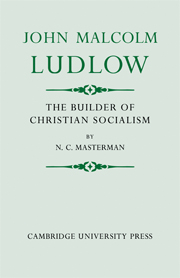Book contents
- Frontmatter
- Contents
- Acknowledgements
- INTRODUCTION
- I THE PARISIAN SCHOOLBOY
- II THE STRANGE YOUNG LAWYER
- III THE FRATERNAL CHRISTIAN
- IV FRENCH SOCIALISM FOR ENGLISH CHARTISTS
- V THE STATESMAN OF CO-OPERATION
- VI THE PRODUCER'S THEORETICIAN
- VII A PROPHET OUT-PROPHESIED?
- VIII REVIEWER AND EDUCATIONALIST
- IX THE DEMOCRATIC IMPERIALIST
- X THE MENTOR OF GERMANS
- XI LEGISLATOR AND CIVIL SERVANT
- XII THE CRITICAL UNIONIST
- Conclusion: LUDLOW'S ACHIEVEMENT
- Appendix: LUDLOW ON THE JUNTA
- Notes
- Bibliography
- Index
IV - FRENCH SOCIALISM FOR ENGLISH CHARTISTS
Published online by Cambridge University Press: 07 October 2011
- Frontmatter
- Contents
- Acknowledgements
- INTRODUCTION
- I THE PARISIAN SCHOOLBOY
- II THE STRANGE YOUNG LAWYER
- III THE FRATERNAL CHRISTIAN
- IV FRENCH SOCIALISM FOR ENGLISH CHARTISTS
- V THE STATESMAN OF CO-OPERATION
- VI THE PRODUCER'S THEORETICIAN
- VII A PROPHET OUT-PROPHESIED?
- VIII REVIEWER AND EDUCATIONALIST
- IX THE DEMOCRATIC IMPERIALIST
- X THE MENTOR OF GERMANS
- XI LEGISLATOR AND CIVIL SERVANT
- XII THE CRITICAL UNIONIST
- Conclusion: LUDLOW'S ACHIEVEMENT
- Appendix: LUDLOW ON THE JUNTA
- Notes
- Bibliography
- Index
Summary
Whatever anyone else was trying to do with Politics for the People, Ludlow's primary aim was to use it as the means of gathering together the nucleus of ‘tried moral men’ who (as he had envisaged while in Paris) would take in hand the social revolution. Fortunately, he found someone to help him in this task in a third English friend. This was Charles Mansfield, whom he met whilst visiting Kingsley's home at Eversley during the Easter of 1848. Ludlow was immediately attracted by this handsome aristocrat—of the same family as Judge Mansfield—who had been cut off from his family by his wealthy, pluralistic, Evangelical clergyman father, and had become a scientist, the most brilliant pupil of Michael Faraday. Though primarily a chemist, he was no mere specialist, but was endowed with a Platonic imagination, and made original suggestions in a wide range of scientific and technological fields. At the same time, his sensitive, loving nature had already made him into something of a Socialist. As a self-taught doctor, he sought desperately to alleviate the suffering of the poor and the destitute, with whom he tried to identify himself partly because he, too, was tortured by unrequited love. Intense emotional friendships between men, like that which existed between Hallam and Tennyson, were very common in this age, reacting from the hard-boiled rationalist eighteenth-century philosophy. Mansfield became for Ludlow the most loved friend he ever had.
- Type
- Chapter
- Information
- John Malcolm LudlowThe Builder of Christian Socialism, pp. 74 - 94Publisher: Cambridge University PressPrint publication year: 1963



